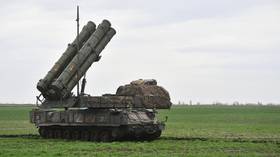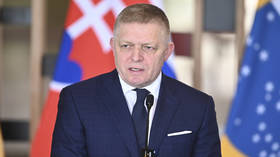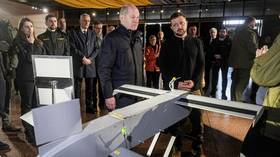Experts disagree over Georgia-Ossetia conflict
Political analysts and experts from Russia and abroad give their opinions on the armed conflict between Georgia and its breakaway republic of South Ossetia.
“US is behind Georgia's military build-up”
The U.S. is responsible for the militarisation of Georgia, providing it with finance and weapons, says Chairman of the Russia's State Duma Security Committee Vladimir Vasilyev.
“Georgia could have used the years of Saakashvili's presidency in different ways – to build up the economy, to develop the infrastructure, to solve social issues both in South Ossetia, Abkhazia and the whole state. Instead, the Georgian leadership with president Saakashvili undertook consistent steps to increase its military budget from $US 30 million to $US 1 billion – Georgia was preparing for a military action,” Vasilyev also says.
“It’s Russia vs the West”
The military actions in South Ossetia are not just a confrontation between Georgia and its breakaway republic, says Viktor Mizin, a political analyst from the Institute of Strategic Assessment in Moscow.
“What we see here is not just a confrontation of minor republics but probably the confrontation between, I am sorry to say that, Moscow and the entire West because now Russia is basically protecting its clients and its own citizens. Up to 80 per cent of South Ossetian population have Russian passports,” Mizin says.
“EU too weak in the Caucasus to help”
Aleksandr Rahr from the German Council on Foreign Policy says the EU is shocked about what's happening but does not have the means to solve the conflict.
“German Foreign Minister Frank-Walter Steinmeier was trying to solve the Abkhazian conflict. He proposed money to be allocated in the West in order to rebuild the infrastructure of this separatist republic but it didn’t work because sides do not accept European mediators any more. That’s because the EU is politically too weak in the Caucasus. The EU has no real economic interests in the region and it has no armed forces there. It failed in the past 16 years to develop some kind of co-operation with Russia and Georgia, or to join the peacekeeping missions in the region,” says Rahr.
“It’s an attack against Russia”
Aleksandr Pikaev, a political analyst from the Committee of Scientists for Global Security, says since Russian peacekeepers were killed in Georgia’s attack against South Ossetia, it is an attack against Russia as well.
“Several Russian peacekeepers have been killed and that has greatly increased the stakes in the conflict because, a few weeks ago, President Medvedev personally called Mikhail Saakashvili and asked him to refrain from using force against Russian peacekeepers, and the worst has happened. The Georgians killed Russian peacekeepers in South Ossetia – and it is an attack not only against South Ossetia. It’s an attack against Russia,” Pikaev said.
“There is profound mistrust between the sides”
Andrey Kortunov from New Eurasia Foundation told RT that it will be very difficult to restore trust between the two sides.
“Militarily the balance of powers is quite clear. Russia is predominant and Georgia is not in a position to challenge Russian might. But the question is about the politics behind it and the big uncertainty is whether Georgia is able to present itself as a victim and not as an aggressor. I think this conflict will be with us for quite a time. There is a very profound sense of mistrust on both sides and I think it would be extremely difficult to restore the situation that we had a couple of days ago,” Kortunov said.












